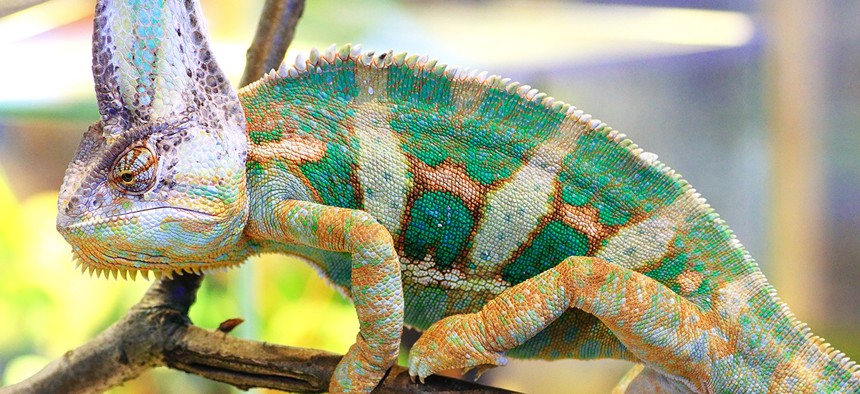
Like a chameleon, Lincoln Chafee has changed his political colors a few times. MattiaATH/Shutterstock.com
Why a Political Chameleon Thinks He Can Beat Hillary Clinton in 2016
Rhode Island's Lincoln Chafee’s pitch is that all politics are local.
Lincoln Chafee is a soft-spoken, party-switching Rhode Island Democrat. And he thinks he deserves the Democratic nomination for president in 2016 more than Hillary Rodham Clinton.
Chafee says he plans to distinguish himself from other Democrats in the race, whether Clinton or another challenger, by touting his foreign policy worldview. When he was in Congress, he was one of 23 senators who voted against the Iraq War—and the only Republican senator to do so. He says Clinton's yea vote should disqualify her from receiving the Democratic nomination.
"One of the motivators for me to run is, I just don't think the United States president should have voted for that huge mistake," Chafee told National Journal. "And I definitely don't think the Democratic party nominee should have made that huge mistake."
Chafee has a checkered electoral history. He lost his Senate reelection to Sheldon Whitehouse in 2006, and decided not to run for reelection as governor of Rhode Island in 2014 after weathering terrible approval ratings, but not before switching to the Democratic party in an attempt to widen his appeal.
According to Chafee, his political colors may have changed, but his core values haven't. While he will be painted as a political changeling, both former Sen. Jim Webb and Clinton have supported Republicans in past political lives. And while that's a strategy that hasn't given Chafee as much success as it has for Clinton, he gave his resume a positive spin.
"I've had 12 elections, and I've won 10 of them," he said. "I know what it takes to win an election."
For someone who's only been a member of the Democratic party for less than two years, he maintains an astoundingly idealistic view of its primary voters' openness to switching their allegiance to a candidate. As Chafee starts campaigning in earnest, with planned travels to Iowa, New Hampshire, and South Carolina, he'll have to confront voters who not only support Clinton, but have no idea who they're talking to.
"I understand, having been in politics all these years, that when somebody's 100 percent committed, there's not much you can say. If they're 99.9, I've got a shot. But I understand. Sometimes people are 100 percent committed, and I respect that," he said. "If there's a 1 percent chance that they are open to my candidacy, I look forward to making my case."
Like former Maryland Gov. Martin O'Malley, Chafee served as governor of a blue state on the East Coast. Like Webb, Chafee is an anti-war Republican-turned-Democrat who hopes to reach more moderates than Clinton will. And like Sen. Bernie Sanders, Chafee has worn his political independence with pride. Chafee says his experience splits the difference with the three of them.
"I believe I will be the only candidate that will have served as a mayor of a city, as governor of a state, and as United States senator. That's a good resume," he said. "I don't see any problem of translating that experience to all the other 49 states. There are potholes and barking dogs in every community! Better schools: That's what people care about. Local issues."
It's a pitch that could appeal to crunchy Democratic primary voters. In a way, it's the progressive mirror image of the tea party, which grew prominence and won elections by branding its candidates as outside the loop of national politics. Think of it as locavorism, but for politics; if Hillary Clinton is Coca-Cola, Lincoln Chafee is the locally brewed kombucha at the organic bodega.
But feel-good politics only gets you so far. Alone, it cannot trump the type of name recognition Clinton enjoys—no matter how much she might resent it. And in just a few days, Chafee, O'Malley, Webb, and Sanders will finally get to feel the full glare of the public spotlight on Clinton—and start to figure out how to survive in her shadow.
(Image via MattiaATH/Shutterstock.com)







